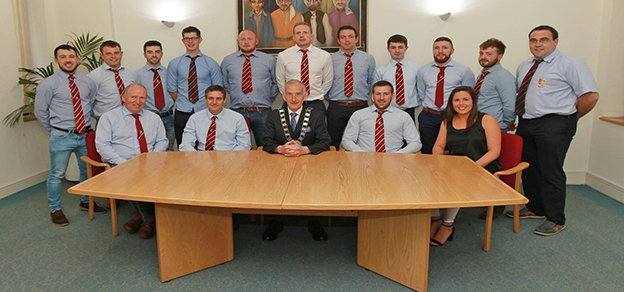CORPORATE SERVICES & HUMAN RESOURCES
The Corporate Services and Human Resources Section is responsible for the provision and management of a wide range of services which includes Council and Corporate Policy Group meetings, Register of Electors, Freedom of Information and a wide variety of ancillary services relating to the business of the Council.
CORPORATE SERVICES
• Management of Council and Corporate Policy Group Meetings, Attendance of Councillors at Conferences, Payment of Councillors Allowances and Expenses, Civic Receptions, Linkage with National Bodies such as LAMA and ACCC, Joint Policing Committees.
• Register of Electors
• Local Elections
• Customer Service
• Corporate Communications – Press Releases
• Co-Ordination of Customer Service Performance Indicators
• Control of Dogs
• Coroners Court
• Management of Council Property
• Preparation of Annual Report
• Preparation of Corporate Plan
• Ethics Register
• Freedom of Information
• Ombudsman
• Data Protection
• Public Relations
• Irish Language Scheme
• Disability Plan
• Schools Business Programme Partnership
• Service Indicators co-ordination.
• Promotion of new Council initiatives such as Fix My Street, MapAlerter
• Major Emergency Management – Communications. Liaison with public, media and Councillors including during severe weather
HUMAN RESOURCES
Employees: 263 (WTE) as at 31/12/2017 (including 47 Retained Fire Fighters)
• Manpower Planning, Recruitment and Selection
• Deployment of staff to all service areas.
• Training, Learning and Development
• Performance Management (PMDS)
• Industrial Relations
• Staff Wellbeing and Employee Assistance Programme
• Equality & Diversity
• Work Life Balance
• Creating a Positive & Safe Working Environment
• Workplace Partnership
• Superannuation
• Continuing Professional Development (CPD)
• Implementation of Core HR/Payroll/Superannuation System
• Attendance Management
• HR Policy Development.
Carlow County Council has achieved several of the targets and aims of the plan including:
• The transfer of payroll, including the superannuation function to MyPay (operated by Laois County Council).
• Regional procurement of public lighting contract etc.
• Sharing of resources between Carlow Library, new County Museum and Tourist offices.
• Rationalisation of the revenue collection service.
• Preparation and implementation of an overarching workforce plan.
• The transition to a single local authority including Rationalisation of engineering area supervisory structures.
The Department also provides co-ordination and leads on the implementation of the Public Service Agreement under the Public Service Pay and Pensions Agreement of 2017. This includes actions required under the following categories:
• Restructuring
• Shared Services
• Procurement
• E – Government
• Redeployment
Carlow County Council has achieved several of the targets and aims of the plan including:
• The transfer of payroll, including the superannuation function to MyPay (operated by Laois County Council).
• Regional procurement of public lighting contract etc.
• Sharing of resources between Carlow Library, new County Museum and Tourist offices.
• Rationalisation of the revenue collection service.
• Preparation and implementation of an overarching workforce plan.
• The transition to a single local authority including Rationalisation of engineering area supervisory structures.
REGISTER OF ELECTORS
The Register of Electors is produced annually and the Register of Electors for the period 2017/2018 issued on the 1st February 2017. The total number of electors to vote on the Register is 41,110.
CONSTITUTENCY COMMISSION
The Constituency Commission Report was published in July and recommended that the part of the Carlow Constituency which is in Wicklow be transferred back to the Carlow-Kilkenny Constituency and on the 23rd December 2017 the President signed the Electoral Amendment (Dail Constituencies) Act, 2017 (No. 39 of 2017) into law. The entire county of Carlow and Kilkenny will now form a five-seater constituency of Carlow-Kilkenny. The new Register (with East Carlow in the Carlow-Kilkenny constituency) will be used for any Referendum or Presidential election which may occur before the current Dail is dissolved.
OMBUDSMAN
The Office of the Ombudsman was established to examine complaints from members of the public who feel they have been unfairly treated in their dealings with bodies such as Government Departments, Local Authorities, Health Service Executive etc. Carlow County Council received no complaints in 2017.
FREEDOM OF INFORMATION
The Freedom of Information (FOI) Acts, 1997-2014 gives three legal rights to those seeking access to information held by public bodies covered by the Act:
• The right of access to official records created after 21st April 1998 which are held by Government Departments or other public bodies subject to the Act.
• The right to have personal details on official records corrected or updated when such information is incomplete, incorrect or misleading and
• The right to be given reasons for decisions taken by public bodies that affect the requester.
A request for information under the Freedom of Information Act must be made, in writing, and should indicate that the information is being sought under the Freedom of Information Act. The number of requests received under the Freedom of Information Act in 2016 was as follows:

CONTROL OF DOGS
Under the Control of Dogs Acts 1986 & 1992, all dogs except those used wholly for official duties by the Gardai, Defence Forces or the Custom & Excise Services. Section 2 of the Act makes it an offence for a person to keep a dog unless he/she holds a licence for the dog or a general licence covering any number of dogs at specified premises. Carlow County Council and Kilkenny County Council operate a joint Dog Warden Service with two Dog Wardens based at Paulstown. This joint service is currently being provided by the ISPCA until December 2016 with a possibility of a further extension.
Licences issued: 1 January 2017 to 31 December 2017 = 1,256
Income: €20,734
DOG BREEDING ESTABLISHMENT ACT 2010
The Council has also developed protocols for risk assessments and inspection guidelines to act as a template for site assessments. The Council is now conducting at least two unannounced inspections on each registered Dog Breeding Establishment (DBE) each year.
CIVIC FUNCTIONS
Personnel in Corporate Services co-ordinates and hosts all civic functions which range from meeting visiting school groups, delegations, Ambassadors, Ministers through to recognition functions and full Civic Receptions . Civic Receptions are generally held in the Council Chamber or the theatre space in the former Town Hall.
During 2017 there were one civic reception held, one for Tullow Rugby Club. The awarding of a Civic Reception is a function carried out by the Council’s Corporate Policy Group in committee. Civic Receptions are particularly well attended and are usually held on Friday evenings. A number of receptions were also hosted by the Municipal Districts of Carlow and Muinebheag.


BUSINESS IN THE COMMUNITY
The Council has been involved for several years now in an initiative with an organization called the ‘Schools to Business Partnership’, whereby the Council has a link with Carlow Vocational School. Under this initiative, the Council delivers a programme with transition year students who visit the Council and attend brief talks from different staff about their work for the Council (‘a day in the life’). The student also has a site visit, to locations such as the Fire Station, Library etc. The final phase of the programme involves the Council’s HR Department delivering CV and interview preparation advice, followed by a Council team attending at the school, conducting mock interviews and delivering feedback.
The annual assessments of the scheme have been very positive over the last number of years.
CORPORATE PROPERTY
The Corporate Affairs Section is responsible for all Corporate Property and the maintenance and upkeep of same. It is also responsible for leases of property to and from other parties. Following the abolition of the Town Councils, the County Council is now also responsible for all former Carlow and Muinebheag Town Council properties and leases There is a recent value for money study carried out by the Department of Housing, Community and Local Government on this subject which is currently under review, to ensure that corporate property management is in line with sector best practice.
CHIEF EXECUTIVES MONTHLY PROGRESS REPORT TO COUNCIL
The Chief Executive prepares a report on the performance of each directorate/section during the month following the previous monthly report. This report is an agenda item at every monthly Council meeting and questions are taken from members on any aspect of the report. This report also serves as a mechanism through which members have oversight of the progress on the implementation of the Corporate Plan. A copy of the Chief Executive’s monthly report is also forwarded to the Department of Housing, Planning, Community and Local Government each month.
LOCAL GOVERNMENT MANAGEMENT AGENCY (LGMA)
The Local Government Management Agency (LGMA) is a state agency of the Department of Housing, Planning, Community and Local Government, established in 2012 to provide a range of services to the Local Government Sector. The Agency was created through the merger of the Local Government Computer Services Board, Local Government Management Services Board and An Comhairle Leabharlanna.
The LGMA is an agency of local authorities, primarily funded by local authorities and operates in the local government sector, reporting on performance as required to the Department of Housing, Planning and Local Government. The Agency aims to meet the needs of the local authorities and the Department of Housing, Planning, Community and Local Government (DHPLG) in delivering on the public-sector reform agenda in the local government sector (particularly in terms of sectoral approaches to service delivery), researching emerging and identified issues, assisting local authorities in the implementation and measurement of change, and supporting, in general, enhanced performance by the local government sector.
The statutory remit of the Agency extends to include:
• Delivery of advisory services to local authorities to assist and co-ordinate the business of these local authorities.
• Delivery of such services as may be required by local authorities in the Industrial Relations (IR) and Human Resource Management (HR) domain.
• Delivery of such services as may be required by local authorities for co-ordinating and securing compatibility in, the use of Information and Communications Technologies (ICT).
• Provision of advice, assistance and services to Library Authorities in relation to the public library service.
• Provision of such other management services as may be required by Local Authorities.
• Provision of such services for meetings of Local Authorities Chief Executives and such support services required by the County and City Management Association (CCMA).
• Provision of such services as required as Registrar of Public Lending Remuneration.
• Provision of such advice, information and assistance required by the Minister for Housing, Planning, Community and Local Government.
CONFERENCES ATTENDED BY COUNCILLORS IN 2017

